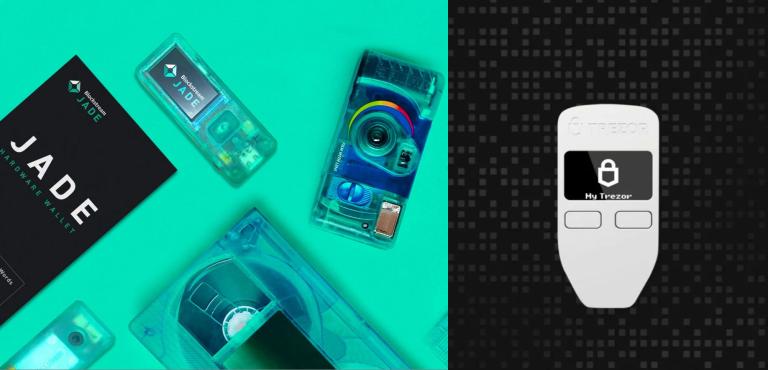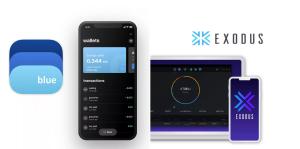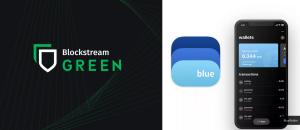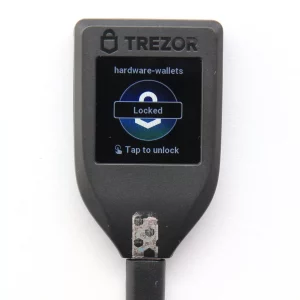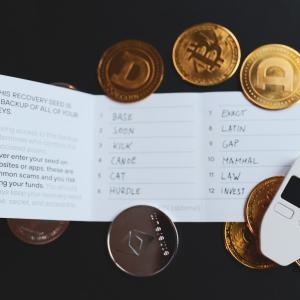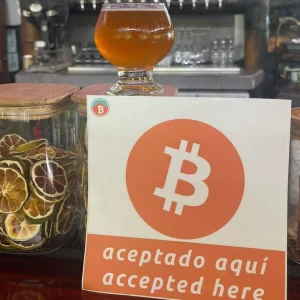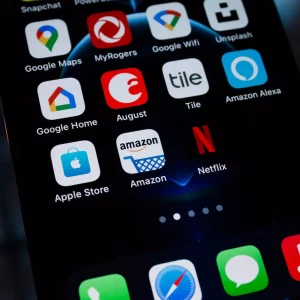Deciding between Blockstream Jade and Trezor for your Bitcoin cold storage can be quite challenging. Both are secure, open-source hardware wallets, and offer user-friendly interfaces, but their strengths and weaknesses lie in different areas. Let’s look into the details fo Trezor vs Jade .
What is Blockstream Jade Wallet?
Blockstream Jade is a hardware wallet designed to securely store your Bitcoin and Liquid Bitcoin (L-BTC). Launched in 2021, it’s a relatively new product from the established company Blockstream, known for its contributions to the Bitcoin ecosystem since 2014. The company behind the wallet, Blockstream, is based in Canada.
What is Trezor Wallet?
Launched in 2013, Trezor wallet offers a secure way to store your Bitcoin and other cryptocurrencies. The wallet is the brainchild of SatoshiLabs, a Czech Republic-based company founded in 2013 by Marek Palatinus and Pavol Rusnak. It is a popular choice for those seeking a reliable and secure solution from a well-established company in the Bitcoin space.
Price
While Jade’s budget-friendly $64.99 price tag is hard to beat, Trezor offers three options: the new Trezor Safe 3 at $79, feature-packed Model T at $179, and the more affordable Model One at $59. However, the Model One lacks some of the advanced features found in the Model T and Jade. However, remember that you get what you pay for. Trezor’s Model T boasts a touchscreen, expandable storage via microSD, and a built-in exchange, features Jade lacks.
Security
Both hardware wallets are built on solid foundations. They’re open-source, support 2FA and multisig, and utilize the secure BIP39 standard for seed phrase backup and recovery on any compatible platform. Both wallets hold firm to the open-source mantra, “Trust, but Verify.” By being open source hardware wallets, it means the community can view and audit the source code.
However, of the two wallets, Jade is an airgapped Bitcoin wallet, meaning that it can receive and sign Bitcoin transactions completely offline, without ever needing to connect to a computer or the internet. This is achieved through its built-in camera, which allows you to interact with a companion app using QR codes. Unlike Trezor, which still needs a USB connection for some functions, Jade offers the highest level of security against malware and cyberattacks by physically isolating your private keys from any online environment. This makes it particularly appealing for users who store significant amounts of Bitcoin or prioritize maximum security.
In typical hardware wallets, your private keys are stored directly on the device itself. If someone physically steals the device or extracts the chip containing the keys, your funds are compromised. This is known as a “Klepto” attack. Jade doesn’t store your private keys on the device itself. Instead, it uses a combination of a secure PIN and a “blind oracle” server to decrypt your keys when needed. This makes it impossible for anyone to steal your keys even if they have the physical device, mitigating Klepto attacks. Additionally, Jade’s unique design prevents extracting the encryption keys from the device (anti-exfiltration, often abbreviated as “anti-exfil”).
For the most part, your hardware wallet signs the transaction directly, potentially exposing your private key to any vulnerabilities in the signing process. Jade uses a “blind oracle” server to sign transactions blindly. This server only receives the transaction data and your PIN, not your private key itself. This keeps your private key even more secure from potential software or firmware vulnerabilities in the signing process.
When generating your seed phrase or private keys, random numbers (“entropy”) are crucial. Weak sources of randomness can make your keys predictable and vulnerable to attacks. Jade offers a more robust source of entropy compared to Trezor. This includes factors like thermal noise and user interactions, resulting in stronger and less predictable private keys.
Trezor, on the other hand, stores your private keys directly on the device itself, similar to traditional hardware wallets. While it offers strong security measures like a PIN and recovery seed, it is still vulnerable to Klepto attacks if the device is stolen or the chip is extracted. Furthermore, Trezor does not currently utilize blind oracle signing for transactions. Your keys sign the transaction directly on the device.
Trezor uses a combination of human interaction and internal randomness for entropy generation, which is considered secure. However, Jade’s use of additional factors like thermal noise might provide a slightly stronger source of entropy.
If top-notch security with features like blind oracle signing, anti-exfil, and anti-Klepto protection are your main concern, Jade is definitely a better fit.
Read also: Blockstream Jade vs Coldcard
Key Features
Trezor is compatible with Bitcoin and altcoins. It also boasts built-in exchange for buying and selling Bitcoin, CoinJoin (this feature will be discontinued effective June 1st, 2024) and Tor for privacy, and integrations with popular wallets like Electrum, Muun, Wasabi, and Exodus. It has a desktop app for Linux, macOS, Windows, and web app for Chrome (via webUSB or Trezor Bridge), and Firefox. The microSD card on Trezor Model T offers a valuable security enhancement for those who prioritize extra protection against physical attacks.
Jade, on the other hand, is a Bitcoin-only purist, loved by Bitcoin maximalists for its air-gapped signing for ultimate security, Bluetooth connectivity, a built-in camera for scanning QR codes, stateless signing, and a duress wallet for added protection. Privacy enthusiasts might be drawn to Jade’s duress wallet feature, protecting your Bitcoin under duress. In addition, it offers integration with Blockstream Green, BlueWallet, Electrum, Nunchuk, Sparrow, and Specter.
Both hardware are compatible with the following Bitcoin addresses: SegWit, Taproot, and Legacy Addresses. They also simplify data exchange and transactions through QR codes, embrace modern connectivity with a USB-C connector, while promoting enhanced security through a watch-only wallet option.
Jade’s Liquid Network integration offers an interesting alternative for faster and confidential Bitcoin transactions.
Ease of Use
Both wallets offer intuitive color screen interfaces, though Trezor’s desktop app feels slightly more polished, appealing to the tech-savvy. Jade’s reliance on the Blockstream Green companion app might feel like an extra step for some users.
When it comes to ease of use, Jade and Trezor cater to slightly different user experiences. Jade stands out with its user-friendly setup that doesn’t require a computer. Its touchscreen interface provides intuitive navigation. The accompanying mobile app is well-designed and complements the on-device experience with features like transaction history and price tracking. These factors contribute to a minimal learning curve, making Jade accessible to users of all experience levels.
Trezor, on the other hand, requires a computer for initial setup, which might be an obstacle for some users. It uses a button-based navigation system, which might feel less intuitive compared to Jade’s touchscreen, but it’s still functional and reliable. Trezor’s desktop app offers similar functionality to Jade’s, but it requires a computer connection. As a result, Trezor might present a slightly steeper learning curve for beginners.
While you can manage your Trezor hardware wallet using Trezor Suite in English, Spanish, Russian, Japanese, and Czech, the Blockstream Jade wallet, firmware, and all user guides are currently only available in English.
Blockstream Jade vs Trezor Safe 3
Trezor Safe 3 is the latest version of Trezor wallet released in 2023. Both Blockstream Jade, released in 2021, and Trezor Safe 3 take different approaches to security.
Blockstream Jade does not use a secure element chip, commonly found in many hardware wallets, including Trezor Safe 3. Instead, Jade uses blind oracle model. This model allows it to remain entirely open-source while achieving similar (if not better) protection against physical attacks. The model essentially acts as a “virtual” secure element, isolating your private keys from any online environment.
Trezor Safe 3 uses a secure element chip, a specialized chip designed to safeguard cryptographic keys. This chip enhances physical security by adding another layer to the PIN protection and helps verify device authenticity. While secure elements offer strong protection, they are typically closed-source and increase hardware wallet costs.
Both wallets offer USB-C for wired connections. However, Jade takes it a step further with integrated camera, QR code, and Bluetooth connectivity. Moreover, both wallets support the industry-standard BIP39 recovery phrase for seed phrase backup.
Trezor vs Jade: Summary
Here’s the summary of our review of Trezor vs Jade:
| Aspect | Jade | Trezor |
|---|---|---|
| Open source hardware wallet | Yes | Yes |
| Price | $64.99 | Model One: $59, Model T: $179 |
| Security | Airgapped Bitcoin wallet | Private keys stored directly on device (secure element chip for the newest Trezor Safe 3) |
| Blind oracle signing | Vulnerable to Klepto attacks | |
| Anti-exfil protection | PIN and recovery seed for protection | |
| Strong entropy generation | Relies on human interaction and randomness | |
| SegWit,Legacy Address, Taproot | Yes | Yes |
| Multisig, 2FA, BIP39 recovery phrase | Yes | Yes |
| Bitcoin-only | Yes | No (Bitcoin and altcoin) |
| Interfaces | Bluetooth, QR code, Camera, USB-C | USB-C connector |
| Transaction Signing | Stateless signing | Traditional signing process |
| Duress Wallet | Yes | No |
| CoinJoin | No | Yes, but it will be discontinued from June 1st, 2024 |
| Watch-only wallet Wallet, xPub | Yes | Yes |
| Liquid Network Integration | Available | Not available |
| Exchange Integration | Not available | Built-in exchange for buying/selling BTC |
| Wallet Integrations | Blockstream Green, BlueWallet, Electrum, Nunchuk, Sparrow, Specter, etc. | BlueWallet, Electrum, Muun, Wasabi, Exodus, etc. |
| Ease of Use | Intuitive touchscreen interface | Button-based navigation system |
| Setup without a computer | Initial setup requires a computer | |
| Well-designed mobile app | Desktop app for wallet management | |
| Minimal learning curve | Slightly steeper learning curve | |
| Language | English | English, Spanish, Russian, Japanese, and Czech |
Trezor vs Blockstream Jade: Which One Should You Use?
So, who wins? Trezor or Jade? It depends. There’s no “one size fits all” answer. While both are open source Bitcoin wallets, for budget-conscious Bitcoin purists, Jade’s affordability is hard to beat. Wallets like Jade that focus solely on Bitcoin reduce the attack surface for hackers and optimize features specifically for Bitcoin transactions. But for those seeking advanced features such as in-built exchange and CoinJoin, Trezor remains a powerful contender. However, note that Trezor is shutting down its CoinJoin feature effective from June 1st, 2024.
With its 2013 launch, Trezor is a more established wallet with a longer track record and wider user base than Blockstream Jade, which was launched in 2021. Trezor’s long history chas contributed to its increased peer review and established reputation in the hardware wallet market. Its launch predates Jade by several years, and this translates to a more extensive community backing, more testing by security experts, and a longer history of successfully protecting users’ funds.
However, the airgapp feature and other security features like blind oracle signing, anti-exfil, and anti-Klepto protection offered by Jade are ideal for maximum protection, especially for those holding substantial amounts. Moreover, by solely focusing on Bitcoin, Jade’s team has dedicated all its resources to optimizing features and security specifically for Bitcoin transactions.
The ease-of-use factor leans towards Jade’s intuitive touchscreen and mobile app setup. However, those comfortable with desktop setup might appreciate Trezor’s desktop app for Linux, macOS, and Windows. It’s important to note that Jade provides access to Liquid Networks, a sidechain for faster and more private transactions of larger amounts.
The best choice of a hardware Bitcoin wallet will ultimately depend on your needs. We advise you to weigh your budget, security preferences, and desired features carefully before making your decision. There’s no one-size-fits-all solution in the world of hardware wallets. Ultimately, the best wallet is the one that makes you feel comfortable and confident about the security of your funds. In this regard, we lean more towards Jade for several reasons, one of them being its exclusive focus on Bitcoin, airgap functionality, and budget-friendly pricing.
Investing in a hardware wallet is the single most crucial step you can take to safeguard your Bitcoin holdings. These wallets offer an undeniable layer of security against online vulnerabilities, malware attacks, and even physical theft. However, be sure to purchase your hardware wallet directly from the official manufacturer’s website, not from eBay or second-hand sellers, to avoid compromised devices.

